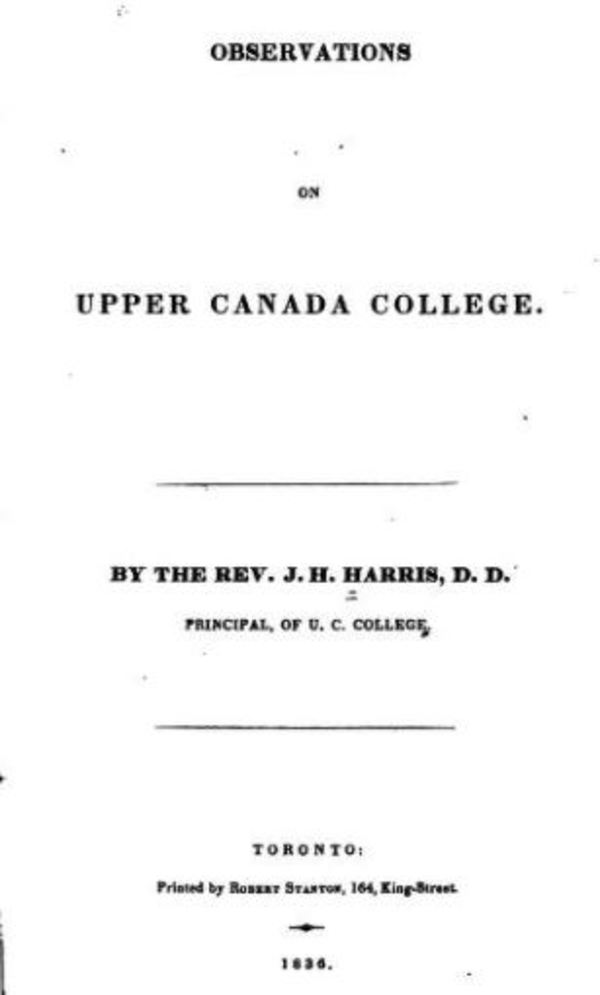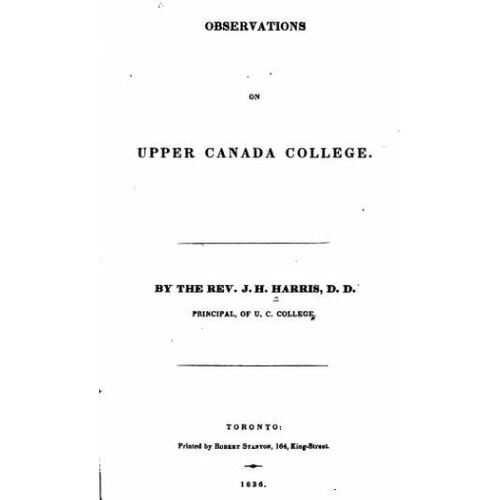
Source: Link
HARRIS, JOSEPH HEMINGTON, Church of England clergyman and educator; b. in 1800, son of Joseph and Cordelia Anne Harris of London, England; d. 25 June 1881 at Torquay, Devon, England.
Little is known about Joseph Hemington Harris’ early life save that he came from a middle class family and received a preparatory education at Mill Hill and St Paul’s schools in London. In 1817 he entered St John’s College, Cambridge, where he had a distinguished career as a classical scholar, receiving a ba in 1822 and an ma in 1825. In 1824 he was elected a fellow of Clare College, Cambridge, and was made a deacon in the Church of England; he was priested the following year.
In 1829, the year Harris was awarded a Lambeth dd, Sir John Colborne*, lieutenant governor of Upper Canada, decided to establish a school in York (Toronto) to be known as Upper Canada College, modelled after English public schools. He requested a brother-in-law who was the vice-chancellor of the University of Oxford, a cousin who was a master at Eton College, and the former headmaster of Elizabeth College in Guernsey, Colborne’s previous posting, to seek a suitable candidate for the principalship of the new institution. Their choice was Harris. He readily accepted the appointment and arrived in the colony late in the autumn of that year to prepare for the inauguration of the school.
It opened under favourable auspices on 8 Jan. 1830 with 89 boys. In Harris it had a noted scholar as principal and classics master, the provincial government had granted it a lavish 66,000-acre endowment, and most groups in the colony favoured the project. Opposition came only from Tories such as John Strachan* and John Beverley Robinson*, who feared the college might become a rival to the projected University of King’s College, chartered in 1827.
Although Harris possessed a cold and distant personality, he proved himself a good teacher and administrator. He was often rigid and unyielding in his opinions but soon realized that the conditions of the colony demanded some modifications of the traditional English school practices. Because of the delay in opening King’s College he added a seventh form which imparted what might be described as an introductory university year. For those boys whose parents preferred that their sons be prepared for business he instituted a “partial course” which taught subjects of a commercial nature, notably bookkeeping. He also established a boarding-house for students who could not travel daily to the school.
Upper Canada College prospered under Harris’ regime, which lasted until 1838. It saw slow but steady growth (there were some 133 students in 1838) and earned a reputation for academic excellence. Increasingly, however, it came under attack for its apparent catering to the needs of the upper classes, its seemingly narrow classical curriculum, and its lavish endowment. In 1836 Harris published Observations on Upper Canada College in which he defended the school as a public institution, but his pamphlet did not allay criticism.
Harris immersed himself in the activities of the Church of England at York. He took services and preached in the churches of the town and the surrounding countryside, and assisted the Society for Promoting Christian Knowledge and the Sunday School Society of the Diocese of Quebec. His support of the York Auxiliary Bible Society, however, brought him into further conflict with Strachan, who in 1832 published a pamphlet on John Henry Hobart, Episcopalian bishop of New York, in which he repeated Hobart’s harsh strictures on non-denominational Bible societies and condemned Anglicans who participated in them. Harris was provoked into composing a rejoinder in which he defended the activities and purposes of these organizations.
Harris’ first wife, Charlotte Ann, died in 1834 and he married Jane Yonge, sister-in-law of Sir John Colborne, in 1837. In July, perhaps dismayed by the continued criticism of the college, Harris submitted his resignation as principal to take effect on 1 April 1838. He returned to England. In 1845 he became curate of Cockington, Devon, and in 1848 was presented to the living of Tormoham-with-Torquay, where he remained as vicar until 1879. He retired in that year to Torquay where he died in 1881.
J. H. Harris was the author of A letter to the Hon. & Ven. Archdeacon Strachan in reply to some passages in his “Letter to Dr. Chalmers on the life and character of Bishop Hobart,” respecting the principles and effects of the Bible Society (York [Toronto], 1833); Observations on Upper Canada College (Toronto, 1836); and A sermon, preached at St. James’s Church, York; on Sunday, March, 17th 1833, in aid of the Sunday School Society, for the Diocese of Quebec . . . (York, n.d.). Other works by Harris are listed in British Museum general catalogue.
AO, Strachan (John) papers, Letterbooks, 1812–34, 1827–34. PAC, RG 5, B11, 4. UTA, A73-0015/001, Upper Canada, General Board of Education, Minutes, 14 June 1823–11 March 1833 (copies at AO); A74-0018, Upper Canada College records. Doc. hist. of education in U.C. (Hodgins), I: 284–90; II: 94–96, 171–74; III: 184. The Town of York, 1815–1834: a further collection of documents of early Toronto, ed. with intro. E. G. Firth (Toronto, 1966). Patriot (Toronto), 1834, 1837. Upper Canada Gazette (York), 1829. Alumni Cantabrigienses . . . , comp. John and J. A. Venn (2 pts. in 10v., Cambridge, Eng., 1922–54), pt.II, vol. III: 255. Dominion annual register, 1880–81: 410–11. The roll of pupils of Upper Canada College, Toronto, January, 1830, to June, 1916, ed. A. H. Young (Kingston, Ont., 1917), 54. Wallace, Macmillan dict., 301. A history of Upper Canada College, 1829–1892; with contributions by old Upper Canada College boys, lists of head boys, exhibitioners, university scholars and medallists, and a roll of the school, comp. George Dickson and G. M. Adam (Toronto, 1893), 25–30, 50–64. R. B. Howard, Upper Canada College, 1829–1979: Colborne’s legacy (Toronto, 1979).
Cite This Article
J. D. Purdy, “HARRIS, JOSEPH HEMINGTON,” in Dictionary of Canadian Biography, vol. 11, University of Toronto/Université Laval, 2003–, accessed April 28, 2025, https://www.biographi.ca/en/bio/harris_joseph_hemington_11E.html.
The citation above shows the format for footnotes and endnotes according to the Chicago manual of style (16th edition). Information to be used in other citation formats:
| Permalink: | https://www.biographi.ca/en/bio/harris_joseph_hemington_11E.html |
| Author of Article: | J. D. Purdy |
| Title of Article: | HARRIS, JOSEPH HEMINGTON |
| Publication Name: | Dictionary of Canadian Biography, vol. 11 |
| Publisher: | University of Toronto/Université Laval |
| Year of revision: | 1982 |
| Access Date: | April 28, 2025 |



